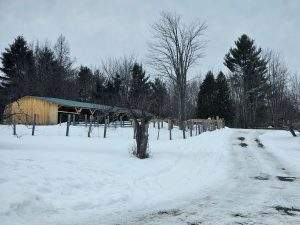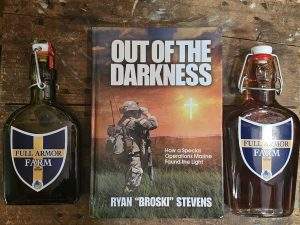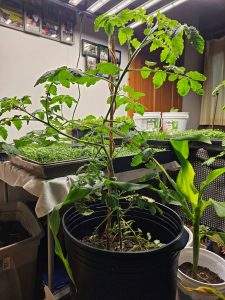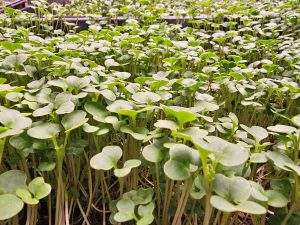NEW VINEYARD – “It’s been an interesting ride,” Ryan Stevens said in describing his family’s small farm in New Vineyard.
Full Armor Farm is home to the Stevens family: Ryan and Stephanie, and their children RJ, Ester, Gideon, Miriam, and Gabrielle. The Stevenses grow a variety of fruits and vegetables and raise Scottish Highland cattle – the ‘fluffy cows’ – along with chickens and ducks. During the early spring, the family spends time out in the sugarbush, tapping maple trees and making syrup.

While February can be a slower season on a farm, maple sugar season is just around the corner. This year, they have tapped 750 maple trees. Last year they produced 77 gallons of syrup. “Anything close to that will be a blessing,” Ryan said of this year’s upcoming season.
In addition to maple syrup, the Stevenses tap birch trees and make birch syrup. Birch season follows hot on the heels of maple season, but on a biannual schedule – tapping is every other year instead of the annual process that maple season takes.
This is a year for birch trees, and the family has been running lines for trees this week, hoping for 50 to 60 taps on birch trees. “If we make ten gallons that’ll go down in the win column,” Ryan said.
While the process of making syrup from birch and maple sap is the same at the core, there are critical differences that the Stevenses have adapted to. Birch sap runs about 120 gallons of sap to a gallon of syrup, compared to the 40 gallons of maple sap to one gallon of maple syrup. The two types of sap are best handled in separate evaporators, and the Stevenses use lines for collecting maple sap and buckets for collecting birch.
Birch syrup, which is darker and less sweet than maple syrup, can be used in place of molasses in some recipes. Stephanie also uses it as a marinade or to saute vegetables, or in pies and baked goods.
Stephanie makes infused maple syrups – blueberry syrup with wild blueberries from Hargest Blueberries in Salem Township is an amazing combination – and they’re also experimenting with aged syrup in oak barrels that previously held peach brandy.
Farming was not the plan for Ryan and Stephanie initially. Both retired from the United States Marine Corps for medical reasons in 2018, part of a story which is shared in Ryan’s book, “Out of the Darkness: How a Special Operations Marine Found the Light”.

Their choice of name for the farm – Full Armor Farm – is a reference to a Bible verse that speaks to Ryan’s journey and the faith he and Stephanie share. This, too, is shared within the pages of Ryan’s book.
“Steph got me interested in farming,” Ryan said as we sat around their kitchen counter to chat. While working through the process of medical retirement with the VA, the couple took classes and developed a business plan for a farm. The property in New Vineyard was purchased in 2016, and in early 2018 they moved to Maine, just a few miles from Ryan’s hometown of Strong.
They decided to build up the farm slowly and explore the different options available to them. When they purchased the property, they did not know about the 20 acre sugarbush, a woodland of predominantly maple trees primed for tapping. They also did not know about the apple trees, some of which are sixty or seventy years old, which produce the fruit for apple cider and apple butter in the fall.
That first spring in Maine, they made their first batch of maple syrup using extra sap from Ryan’s brother’s operation and a borrowed barrel stove.
In 2020, Ryan and Stephanie received a grant from the Farmer Veteran Coalition, which went towards lines and collection tanks for maple syrup.
Another large purchase was a reverse osmosis machine, which significantly reduces the time spent on boiling down sap, but still allows the full-bodied flavor of a wood-fired syrup, because the syrup is still made over a wood-fired evaporator.
A high-tunnel garden shelters plants from weather and adds a couple months to the growing season, which can be short in the mountains of Maine.
The family has a freeze dryer, which allows them to preserve food and even sell items, such as freeze dried fiddleheads. The unique process of freeze drying helps preserve the nutritional value of foods more than a standard dehydrator, Stephanie said, and if stored correctly, some freeze dried foods can be shelf stable for fifteen or twenty years.
Last year Ryan planted about 200 fir seedlings at the recommendation of his friend Adam Dyar, who manages McClure’s Tree Nursery in Kingfield. This year he hopes to plant another three or four hundred seedlings, which will take as much as ten to twelve years to grow to a size where they can harvest and sell them for Christmas trees.
Part of the goal is to figure out what works for them and to make investments for the future. Ryan has worked on clearing a pine tree grove and plans to replant the trees in proper rows for a pine harvest, years down the road. They are making plans to expand the apple orchard and replace some of the oldest trees, which are sixty to seventy years old.
“That’s the good thing about a small farm, you can just try new things,” Ryan said.

Stephanie said that they have been inventorying the native plants growing on the property and learning the different uses and characteristics of each plant, and how they can best use them. Freeze drying fiddleheads produced an edible novelty, while freeze drying ramps resulted, essentially, in dried onions that lacked all the charm and appeal of fresh ramps.
Ryan and Stephanie’s children are involved in the daily operations on the farm as well. The kids are home educated, and spend time each day working on their school books, but they also help with chores around the farm. Their oldest son, RJ, has developed quite a green thumb. He recently sprouted his own sweet potato slips and is currently growing red potatoes in a large bin under a grow-light, along with cherry tomatoes, sprouts, and microgreens. He has his own worm farm and uses the worm castings for fertilizer.

At the end of my visit to the farm, all the kids except the baby bundled into snow suits and took me out for a tour of the farm, along with Ryan’s service dog, Moose. Blanketed under snow, not much was visible, but the children and their parents both expressed such enthusiasm about the farm that it was easy to see the promise and potential.
“We’re always learning new things,” Ryan said.
Full Armor Farm is located at 12 Stewart Road in New Vineyard. During the summer and fall, the Stevenses run a farm stand on the front porch. Orders can also be placed online at www.fullarmorfarm.com.





